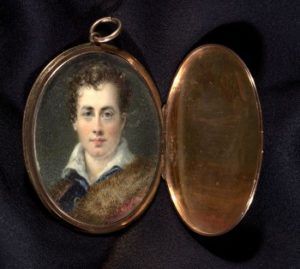
From author’s collection
August was hot in Venice, as might have been expected, and the Darcy party sat outside in the garden, fanning themselves and taking some comfort from the shade offered by the olive and persimmon trees. There was no coolness to be derived from the canal below the terraces of the Palazzo Mocenigo, as no breeze stirred, that might dispel the odours of the warm water. The servants diligently brought drinks of lemon, and bowls of fruit and almond cakes were laid on the pretty ironwork garden tables with blue, white and yellow tiled designs.
Elizabeth looked at the display admiringly. “If it were not for the beautiful Italian fruit, the summer’s warmth might be too much, but we never had such even at Pemberley.” The abundance of figs, nectarines, albicocce apricots, cherries, and the purple plums called cosce di monaca, were all in their prime of ripeness, with the frutti di bosco (berries of the undergrowth), redcurrants, blackcurrents and bilberries, particularly tempting. The display was accompanied by cream in cerramiche bowls, beautifully painted with representations of fruit as lovely as the toothsome specimens that filled them.
“It is far too hot,” said Lady Catherine crossly. “Offensively so. We ought to have departed for England more than two months ago, and it surpasses comprehension why we did not go when I had planned we should. It is never desirable to abandon well-thought out plans such as mine, I will have you know, Darcy. I expended a great deal of trouble and thought on ours, and they were so superior, no one else could have drawn up better.”
“I daresay not, Aunt Catherine,” he agreed, “and we can resume our original scheme when the time is ripe.”
“And that depends upon me, you know,” Lydia informed her importantly. She reached for a bowl, scooped out all the currents that were left, and topped them with half the cream.
“Upon you!” scoffed Lady Catherine, “as if our travelling plans should depend upon such a person. If this were not such a serious situation, I should laugh.”
“That would be a sight to see,” replied Lydia, interested, “I never saw you laugh, and doubt any one has.”
“Mrs. Wickham, I will have you know that I have ever been celebrated for my remarkably elevated wit and humour!” she huffed.
Elizabeth caught her husband’s eye, and told his aunt soothingly, “Certainly, Aunt Catherine, your humour is of a remarkable variety, indeed.”
“Naturally. Bon mots and witticisms are my especial forte. That being so, Mrs. Darcy, I feel quite justified in asking you, once more, to at least attempt to control this creature from her insults. She is insufferable, even in cool weather, and in hot, is past bearing.”
“I do not feel inclined to pointless effort,” Elizabeth returned, sipping her lemon drink. “Your current residence with us ought to have taught one as perspicacious as yourself, that Lydia is entirely beyond my reach in matters of control.”
“Control! I like that,” exclaimed Lydia. “I am a married woman and under no one’s control. Married women have freedom that single women have not. Also, Lady Catherine, you must acknowledge that I am in a most delicate condition. Can you not see that I am positively bursting out of Lizzy’s gowns already?”
She leaned back on the graceful, carved wooden lawn sofa, filled with needlework cushions, that was the most comfortable seat in the garden. The elegant antique seemed barely able to support Lydia, who was splayed out in a thin white muslin gown that barely covered her enormous belly, eating currents and cream with a silver spoon, but still managing to spatter her middle.
Elizabeth shrugged. “You see it is of no use, Aunt Catherine. And unfortunately is is true that a woman so close to her confinement cannot well be transported on baddish roads across the Continent. We are forced to await the event.”
“And when will that be, do you suppose, or has the creature lost her powers of reckoning?” Lady Catherine snapped.
“Why, no such thing, old lady,” said Lydia airily. “I am somewhere between seven and nine months along, I do reckon. And it would be as good as murder to move me, that is for certain.”
“I trust we will be able to commence the journey in the coolness of October,” Elizabeth said dryly.
“Yes,” said Lydia cheerfully, “as I told you all along, it does not do to transport unripe fruit. I always meant to bloom where I was planted, from the very first.”
“And with no care to inconveniencing the entire party, all of whom are your superiors in position and in understanding,” Lady Catherine fumed.
“I cannot argue myself into being a fine lady, but I vow I have understanding enough about confinements. I have had more of them than you.”
“Nonsense! That is merely your excuse for lounging endlessly here. Mr. Darcy’s carriages are the very last word in luxury, well sprung and well hung, and he has a trusted entourage. You would be exposed to no risk. In our family it is usual for ladies to travel at any time, even when in your condition.”
“Is that so?” Lydia retorted, reaching for a fistful of cherries and proceeding to spit out pits. “But every one knows it is not good for children. Ten to one that is why your own daughter is such a puny weak thing. You probably trotted about constantly when you were in pig.”
Lady Catherine spluttered so that she knocked over her own dish of figs, and Elizabeth had to beckon to the servant to pick them up.
But Lydia was not done. “Besides,” she pursued, “I always meant to be laid-up here, so that I could present Lord Byron with his own offspring. Sure, when he sees his own child, he’ll change his mind about keeping it. I am sure it will be his spitting image.”
“That would be a clever scheme if it were based on any thing of substance,” Elizabeth mentioned, “but you have told us that he is adamant against such an eventuality; and besides, is not Byron determined to go to his summer villa, Este, on Lake Como, Darcy?”

Villa d’Este, Lake Como
“Not yet, it seems,” her husband replied. “As a matter of fact I have had a note from him this morning. He is waiting for some guests before departing for Este. I believe one of the party is a child. Perhaps that explains why he begs the favour of our presence at dinner tonight.”
“He is here! And I shall see him!” Lydia clapped her berry stained hands with ecstasy.
Darcy looked severely at her. “The invitation is for myself and Elizabeth only, Lydia,” he said. “Byron conditioned for that. He wishes to introduce us to a literary figure who will be staying with him.”
Elizabeth’s face expressed her surprise and curiosity. “A literary personage – and a child? That is a curiosity that requires some explanation. I am eager to hear what it is.”
“It is the poet Shelley,” Darcy proceeded calmly, “whose acquaintance he invites us to make; I conclude that this may be due to his knowing our love for poetry, and I also suppose that he may wish the child to find playmates in our children. But this is only speculation.”
Lady Catherine’s face reddened with exasperation. “Byron! Shelley! Poets of such fame, the finest in the world! Good heavens, Darcy, I must be there,” she insisted. “For who has a higher literary taste than I? I am only surprised that Byron did not think of me at once, surely his intimate correspondent deserves such a compliment.”
“Why, to be sure, Aunt, he has thought of you, and of Lydia too. He asks particularly that you both remain here, and do him the favour of receiving Miss Claire Clairmont. She is Shelley’s sister-in-law, and will be arriving with her child, escorted by Shelley himself. A little girl called Allegra, rather younger than our children. You are to entertain Miss Clairmont in our portion of the palazzo, as Byron is particularly averse to meeting her.”

Allegra
The others were dumbfounded and looked at each other speechlessly.
“But who is the little girl’s father?” asked Elizabeth, after a moment, perplexed. “Why will Lord Byron not entertain his own guests?”
“I never heard of such behavior,” snorted Lady Catherine. “But Byron is so very eccentric.”
“His domestic situation is not our concern,” Darcy told her. “He knows we have children, and nursemaids here, and we can doubtless help him make things more comfortable for the child, whatever its paternity.”
“The oddest things do happen in Italy,” Elizabeth meditated.
Darcy smiled at her. “To be sure. The incessant dramatic turn of events does make one tend to forget why we came here in the first place. We only meant to spend a pleasant spring in Venice, you recollect, where we might take in the opera and the art of the ages, and the children might learn some Italian.”
“And then we were going to Lake Como, for the summer months. I confess that I looked forward to that very much, for the children as well as myself. However it seems that I am destined never to see lakes.”

From author’s collection
“Yes, you missed the English lakes with your aunt and uncle when they took a fateful turn and you ended up at Pemberley; but I trust you are not sorry for that, Elizabeth.”
“Sorry! I will not flatter you by expounding on my eternal thankfulness.”
“And I have been trying to make it up to you ever since, with a proper Grand Tour; but then the bambinos came along, and somehow or other we still have not achieved a lake.”
“Be that as it may,” Lady Catherine interrupted their romantic exchange, “I am certain something indecent is going on. Shelley’s reputation for immorality is every whit as bad as Lord Byron’s. They are proponents of Free Love, I have heard. That may be without consequences for careless young men, and perhaps older women, but the circumstances are tragic for those young women who succumb to their seducers.”
Lydia had been eagerly pursuing her own line of thought. “I tell you what, I bet you any thing the child is Shelley’s own. That Miss Clairmont is up to no good. What is the word they use for having a baby with your brother-in-law?”
“I suppose you mean incest,” said Elizabeth resignedly, “however, do not let your imagination run wild.”
“You ought not to speak of such matters,” Lady Catherine said, drawing her heavy eyebrows together disapprovingly. “Incest indeed! These are ladies and gentlemen, I will have you know, not beasts of the field. The idea.”
“Well, but do you know that they say Byron himself slept with his own sister?” Lydia informed her with relish. “It was all the gossip of the ton in London. Wickham told me so, himself.”
“Impossible! Shelley is of a noble family. He would never do such a thing.”
“Oh, how I should like to meet him,” said Lydia, wriggling on her sofa so her lapful of cherry pits fell into the grass. “Oh, please can’t you bring me over there, Darcy. I have heard that he is very handsome, and puts Byron himself quite in the shade, now that he is growing corpulent.”
“I said no, Lydia.”
“Oh well, never mind,” she pouted. “If they are here for some time, I shall manage to see them all sooner or later. Oh, look, here is coming a fine carriage now – I wonder if it is them.”
Elizabeth scrutinized the conveyance, which was pulling up at their own gate.
“They seem to have mistaken Lord Byron’s entrance.”
“Possibly not, Elizabeth, if the plan is to have the woman stay here. Byron has no doubt communicated his intentions to them in the matter.”
“I did not think of that,” said Elizabeth, “but you appear to be right. There, only the lady is alighting; the gentleman and a servant remain in the carriage, and I suppose the child too, although we cannot see her.”
“And now the carriage is going on with Shelley in it,” gasped Lydia round-eyed and trying to get a glimpse of the poet, as the lady proceeded down the gravel path. Their own servant hastened forward to carry her portmanteau. “I could just see his profile, Lizzy. He is quite beautiful! You must tell us every single thing about him after you see him this evening, won’t you?”
“How would it be possible to keep any secrets?” Elizabeth commented.
“And I want to hear all about Miss Clairmont’s child, too. I should be so ashamed to have a natural child, I am so glad I was married before my children came.”
Lady Catherine harrumphed. “You need not remind us how nearly that did not come to pass.”
Lydia did not heed her. “But oh,” she exclaimed, “what if – do you think it is possible, Lizzy? What if the child is not Shelley’s? Oh! What if it should be – Byron’s!”
And she clapped her hands over her mouth in horror.

Lord Byron

8 comments
Skip to comment form
How on earth Darcy and Elizabeth stay so calm while living with appalling Lydia and self important Lady Catherine I really don’t know! I’m afraid I’d have thrown them both in the canal by now😱😡! I am supposing the child’s father is Byron and as he doesn’t want to see the mother it certainly doesn’t bode well for Lydia’s ambitions! 🤔😉😂🤣. When will the next excerpt be?
Author
Thanks for reading, Glynis! I’m writing the next episode now (I can’t wait to have the Darcys collide with the Shelley-and-Byron circle – the possibilities!), and I’ll put it up as my May post. I have to take a few weeks off to write a paper for a conference in Canada I’m going to in July, but I don’t mean to let the Venetian adventures languish for long!
How cleaverly woven the paths of the real natural child of Byron (Allegra) with the imaginary one! I can’t wait for the coin to drop for Lydia, but I doubt that it would! I probably should not entertain such thoughts of violence against the pregnant Lydia – but really!!!!!!
I have never seen someone so insolent and self centered in my life!
Darcy ad Elizabeth are real angels andhave the patience of saints!
And I really hope they will be rewarded somehow! Would it be Como or they will get to the Lake District upon their return to England? They will need some holiday after such holiday they had in Venice!
Great reading, Diana!
Author
That’s what I figure, Mihaela. *I* need a holiday in Lake Como after all this! But I’m really getting excited about getting them into the whole Shelley mess, it’s going to be fun to write. I do hope the Darcys (and I) will get their reward. Thanks for your encouragement!
I have some advice for Elizabeth. Mrs Darcy, you have a lady’s maid. You are in a country where it would be quite easy to obtain locks and keys for your rooms and closets. How then is your sister able to get hold of your clothes? Who is she getting to carry out alterations – she is taller than you and more solidly built, especially now? You can easily ensure all your garments are locked away and your maids forbidden to give her any or help her with alterations to them. Obviously she must wear something. Go to the nearest convent and arrange for a supply of the garments worn by novices, or lay sisters, or servants – which would all be very plain and unfashionable, but why should you care about that? – to be procured for her. They will be happy to do it for a generous donation. The cost will be less than that of just one of your gowns. She will of course whine a lot, but again why should you care about that? You are a woman of intelligence and character. Stop acting like a doormat.
Kathleen, I wish I had seen this comment before! You are so right. Lizzy must NOT be a doormat. My tendency to make her one must cease at once! I did suppose that Lydia could get the gowns on, but as she is larger, they must fit very poorly, making her appearance quite grotesque. And she keeps ripping them which I daresay makes them looser…
Oh my, I so enjoy reading this story. Lydia never disappoints, silly girl. And Darcy and Elizabeth are so patient. Thanks so much for continuing to share this story.
Thanks, Lisa! Soon to post another…from another angle!